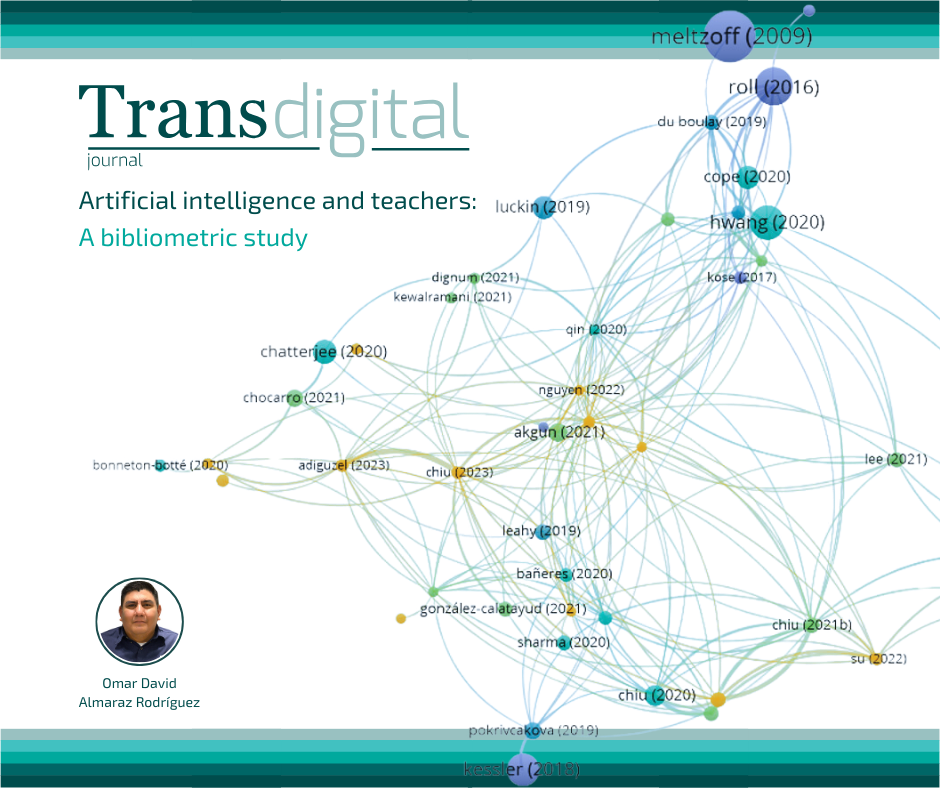Artificial intelligence and teachers
A bibliometric study
DOI:
https://doi.org/10.56162/transdigital279Keywords:
teachers, artificial intelligence, bibliometric studyAbstract
A bibliometric analysis was carried out with 897 research articles on artificial intelligence and teachers, using the results from the Dimensions metasearch engine. The data set obtained was analyzed with Bibliometrix and Vosviewer, with the aim of providing information on research trends on artificial intelligence and teachers. The main results show that research in this area of knowledge goes from 1978 to 2023. Key trends were identified, such as the notable increase in research starting in 2018 and the predominance of publications in journals such as Education and Information Technologies, Sustainability, and International Journal of Emerging Technologies in Learning. Geographically, China leads research in this area, followed by the United States and Spain. Despite the vast production, there are obvious geographic gaps, with countries like Mexico showing limited participation. The most prominent authors in this field come predominantly from Asia, with Chai Ching Sing and Thomas Chiu being central figures in the discussion. Through a co-authorship and citation analysis, seminal works that have influenced current research directions were identified. In conclusion, this study offers a broad and detailed overview of the relationship between artificial intelligence and teachers, highlighting areas of interest and future opportunities for researchers and educators.
References
Adiguzel, T., Kaya, M. H., & Cansu, F. K. (2023). Revolutionizing education with AI: Exploring the transformative potential of ChatGPT. Contemporary Educational Technology, 15(3), ep429. https://doi.org/10.30935/cedtech/13152
Ahmad, S. F., Alam, M. M., Rahmat, M. K., Mubarik, M. S., & Hyder, S. I. (2022). Academic and Administrative Role of Artificial Intelligence in Education. Sustainability, 14. https://doi.org/10.3390/su14031101
Bañeres, D., Rodríguez, M. E., Guerrero-Roldán, A. E., & Karadeniz, A. (2020). An Early Warning System to Detect At-Risk Students in Online Higher Education. Appl. Sci, 10, 4427. https://doi.org/10.3390/app10134427
Celik, I., Dindar, M., Muukkonen, H., & Jarvana S. (2022). The Promises and Challenges of Artificial Intelligence for Teachers: a Systematic Review of Research. TechTrends 66, 616–630. https://doi.org/10.1007/s11528-022-00715-y
Chiu T. K. F., Xia Q., Zhou X., Chai C. S., & Cheng M. (2023) Systematic literature review on opportunities, challenges, and future research recommendations of artificial intelligence in education. Computers and Education: Artificial Intelligence, 4(1). https://doi.org/10.1016/j.caeai.2022.100118
Du Boulay, B. (2019). Escape from the Skinner Box: The case for contemporary intelligent learning environments. Br J Educ Technol, 50, 2902-2919. https://doi.org/10.1111/bjet.12860
Hwang, G. J., Xie, H., Wah, B. W., & Gaševi?, D. (2020). Vision, challenges, roles and research issues of Artificial Intelligence in Education. Computers and Education: Artificial Intelligence, 1, 100001. https://doi.org/10.1016/j.caeai.2020.100001
Kessler, G. (2018). Technology and the future of language teaching. Foreign Language Annals. 51, 205–218.
Meltzoff, A., Kuhl, P., Movellan, J., & Sejnowski, T. (2009). Foundations for a new science of learning. Science, 325(5938), 284-288.
Nguyen, A., Ngo, H.N., Hong, Y., Thi B. (2023). Ethical principles for artificial intelligence in education. Educ Inf Technol, 28, 4221–4241. https://doi.org/10.1007/s10639-022-11316-w
Pokrivcakova, S. (2019). Preparing teachers for the application of AI-powered technologies in foreign language education. Journal of Language and Cultural Education, 7(3), 135-153. https://doi.org/10.2478/jolace-2019-0025
Raif, R. (1978). Toward an applied science of education: Some key questions and directions. Instr Sci, 7, 1-14.
Roll, I., & Wylie, R. (2016). Evolution and revolution in artificial intelligence in education. International Journal of Artificial Intelligence in Education, 26(2), 582-599. https://doi.org/10.1007/s40593-016-0110-3
Tirado, S., Navío, M., O’Connor, P., & Cózar, R. (2023). From Human to Machine: Investigating the Effectiveness of the Conversational AI ChatGPT in Historical Thinking. Education Sciences, 13(8), 803. https://doi.org/10.3390/educsci13080803
Van Raan, A. (2003). The use of bibliometric analysis in research performance assessment and monitoring of interdisciplinary scientific developments. TATuP - Zeitschrift für Technikfolgenabschätzung in Theorie und Praxis, 12(1), 20–29. https://doi.org/10.14512/tatup.12.1.20

Downloads
Autor de correspondencia
El autor de correspodencia se identifica con el siguiente símbolo: *Published
How to Cite
License
Copyright (c) 2024 Omar David Almaraz Rodríguez

This work is licensed under a Creative Commons Attribution 4.0 International License.
All articles in Transdigital are licensed under a Creative Commons Attribution 4.0 International License. Authors hold the copyright and retain publishing rights without restrictions.









